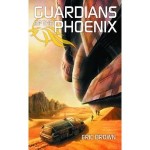Eric Brown’s Guardians of the Phoenix, Reviewed
The Earth is a barren wasteland; North America and Middle have been razed by nuclear strikes, the oceans have evaporated, and the earth is a barren desert dotted only occasionally by a few shallow oases. 
For ten years, Paul has scrabbled for survival among the sand-shrouded ruins of the once-great city of Paris. He is one of thefew desperate humans still surviving. Some scrape a living in the remains of shattered cities; others resort to murder and cannibalism to survive.
When Paul is rescued from one such group of killers, he joins his benefactors in their journey south in search of water. Guardians of the Phoenix tells the story of the last survivors, their desperate fight for survival and their last hope to save the world.
Brown is a traditional storyteller, concentrating on the virtues of storytelling and characterization. His heroes are comparatively decent people, if compromised, while his villains show no regard for life. In that respect Guardians of the Phoenix carries on a long tradition of British SF as typified by John Wyndham and Edmund Cooper, of scratching an existence from a world-changing disaster.
Brian W. Aldiss once disparagingly referred to such novels as “cozy catastrophes” but there is nothing cozy about the lives that the characters lead – it’s probably the most relentlessly relentless scrutiny of life after climate change that’s been written. For that alone Guardians of the Phoenix deserves commendation.
